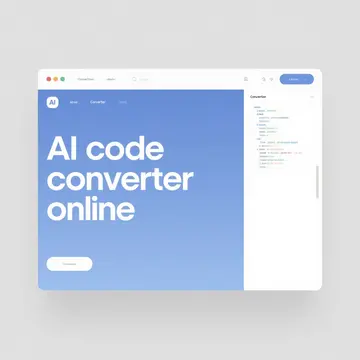Whether you're switching languages, debugging, or modernizing legacy software, an AI code converter can streamline your development workflow. These intelligent tools use machine learning and natural language processing to transform code from one programming language to another with surprising accuracy. This guide explores how to use them, the top platforms available, and why they're revolutionizing software development.

What Is an AI Code Converter?
An AI code converter is a tool powered by artificial intelligence that translates source code from one programming language to another. It also corrects errors, improves code efficiency, and explains logic—all in seconds. Unlike traditional compilers or syntax-based tools, AI converters understand context and logic structures, making their output more adaptable and accurate.
Example Use Cases:
?? Convert Python to JavaScript for web development
?? Migrate legacy Java code to modern TypeScript
?? Translate MATLAB scripts into Python for AI/ML integration
Why Developers Are Turning to AI for Code Conversion
AI tools don't just convert lines of code—they understand the underlying logic. By using an AI code converter, you avoid syntax mismatches, preserve program intent, and accelerate software migration. It's especially helpful when you want to check code for AI compatibility or optimize across platforms.
?? Save Time
AI converts complex logic instantly—what used to take hours now takes minutes.
?? Smarter Refactoring
Convert and improve your code’s structure while switching languages.
?? Platform Adaptation
Quickly adjust legacy apps for new environments or devices using AI.
Step-by-Step Guide to Using an AI Code Converter
Step 1: Choose the Right AI Code Converter
Select a trustworthy platform based on your source and target languages. Popular options include:
Codex by OpenAI – Converts code and suggests improvements
Amazon CodeWhisperer – Ideal for AWS-based code transformation
Replit Ghostwriter – AI coding assistant with real-time conversion
CodeT5 by Salesforce – Open-source transformer model for code understanding
Step 2: Input the Original Code
Paste or upload your existing code. Make sure it's clean, commented, and functional. AI code converters work best with complete functions or modules, rather than scattered snippets.
Step 3: Select Output Language and Format
Choose the target language (e.g., convert from PHP to Python) and select options like syntax format, docstring style, or code comments. This flexibility makes it easy to convert code using AI exactly the way you want.
Step 4: Analyze the Converted Code
Most AI tools provide explanations for the new code structure. This is crucial for debugging, optimization, and learning. Use this opportunity to check for AI code quality and ensure functional parity with the original version.
Step 5: Test and Deploy
Never trust automated conversions blindly. Run tests, perform code reviews, and validate output against sample inputs. Once validated, you can deploy with confidence.
Popular AI Code Converter Tools You Should Try
OpenAI Codex – Supports over 12 languages, including Python, Go, Ruby, and JavaScript
Amazon CodeWhisperer – Designed for enterprise-level teams using AWS
Replit Ghostwriter – AI companion inside the Replit IDE
Kite – Autocompletion tool with AI-powered code translation features
CodeT5 – GitHub-hosted open-source AI with code understanding and translation
Common Challenges and How to Overcome Them
While an AI code converter is powerful, it's not perfect. Here are common pitfalls:
Loss of logic during conversion – Fix by adding more comments and clarifying functions
Syntax inconsistencies – Run linters and formatters in the target language
Dependency mismatches – Make sure to import the correct libraries after conversion
Who Benefits Most from AI Code Converters?
From junior developers to enterprise teams, these tools help anyone looking to speed up workflows and reduce error rates. They're particularly valuable for:
Developers learning new programming languages
Teams modernizing outdated systems
Project managers overseeing multi-platform builds
Freelancers managing diverse client needs
Final Thoughts: Is an AI Code Converter Right for You?
If you're seeking efficiency, accuracy, and productivity in software development, investing time in learning to use an AI code converter is a smart move. It won't replace your programming skills but will enhance your output. You can check code for AI errors, migrate legacy apps, or build hybrid platforms faster than ever.
Key Takeaways
?? Converts code quickly between popular languages
?? Helps developers check for AI code issues and logic gaps
?? Enhances learning through logic explanations and debugging
?? Ideal for migration, platform updates, and language training
Learn more about AI CODE
